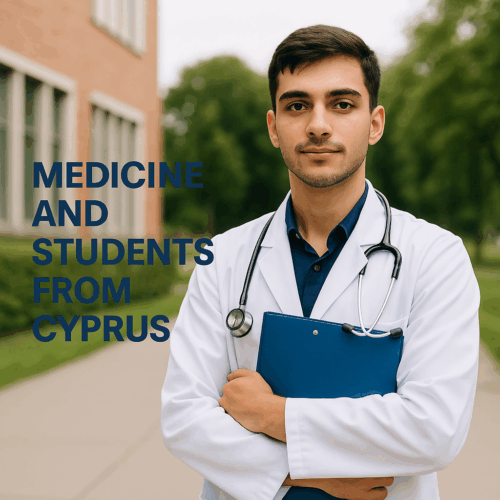
By Antonios Antoniades, Chief Executive – A.A. Unilink (Member of CAEC)
Introduction
Medicine remains one of the most competitive and highly pursued fields of study among Cypriot students. At the same time there has been an increase in demand since the implementation of the new GESY (National Health Service) in Cyprus which has brought many more employment opportunities in the health sector.
While studying without fees, or low tuition fees in Cyprus or Greece has traditionally been the most attractive, limited places and increasing demand has seen many students exploring alternative study destinations mainly across Europe.
Free tuition
Public universities in Cyprus and Greece offer free higher education to Cypriot students, and this includes medicine. Because of their eligibility to study for free, Cypriot students, mainly from public schools, usually focus on securing a place at one of these universities. However, places for medicine are limited, and competition is extremely high with many highly educated students finding themselves missing out. This means that alternative options are a necessity.
Medicine and Brexit
These alternative options are usually for English taught medicine programs in Europe.
The UK has traditionally been a very popular study destination for Cypriots and despite the difficulty in securing admission on to medicine, it was a good financially viable option for those that were successful.
However, since Brexit it is now an option only for the very few, because the cost of studying medicine in the UK for EU students has raised to levels that only the very few can afford.
Unless the student holds a UK passport, these fees will start from approximately the equivalent of €50,000 per year.
Cheaper opportunities
A handful of other European countries offer more affordable English taught medicine options at public universities. The Netherlands, Ireland and Italy are such countries with tuition fees for EU students ranging from €400 – €4,500 per year.
Apart from the low tuition fees, it is easy to travel within Europe and there is no student visa requirement.
On the negative side, competition is again significantly high with many being left disappointed. In some cases, there are also restrictions on the number of university options in these countries but also the results on whether a student is successful or not, are published very late in the admissions cycle.
Greece and English taught medicine
The last few years, a small number of Greek public universities have introduced English taught medicine programs. These are only available to non-Greek nationals and this includes Cypriots.
Tuition fees range between €12,000-€15,000 per year.
Because of educational and cultural ties between Greece and Cyprus, these options are very popular amongst the Cypriot student population.
Competition once again is high and increasing every year with places as usual limited.
It is though, another option for those interested in medicine.
Accessible alternatives in Europe
Several other European universities offer English taught medicine courses with favourable admission process compared to the above options.
Tuition fees start from approximately €12,000 per year.
Countries such as Hungary, the Czech Republic, Slovakia, Lithuania, Spain and Bulgaria offer such opportunities
Although these destinations maybe less familiar to Cypriot students, but they offer a combination of history, quality, affordability, realistic admission prospects and many also house their own university hospitals.
Staying in Cyprus
For those that prefer to stay at home and can afford the tuition fees, they can study at one of the private universities in Cyprus that offer medicine.
These usually begin from approximately €20,000 per year and admissions processes vary depending on the university and depending on the student’s qualifications.
Conclusion
The growing demand among students from Cyprus to study medicine, adding to the limited options of free or low-cost places available, has broadened the range of study destinations being considered. While traditional options such as Cyprus, Greece, and the UK remain important, study destinations in Central and Eastern Europe for English taught medicine programs are becoming increasingly important because of their reasonable tuition fee cost, accessibility, and academic quality.
